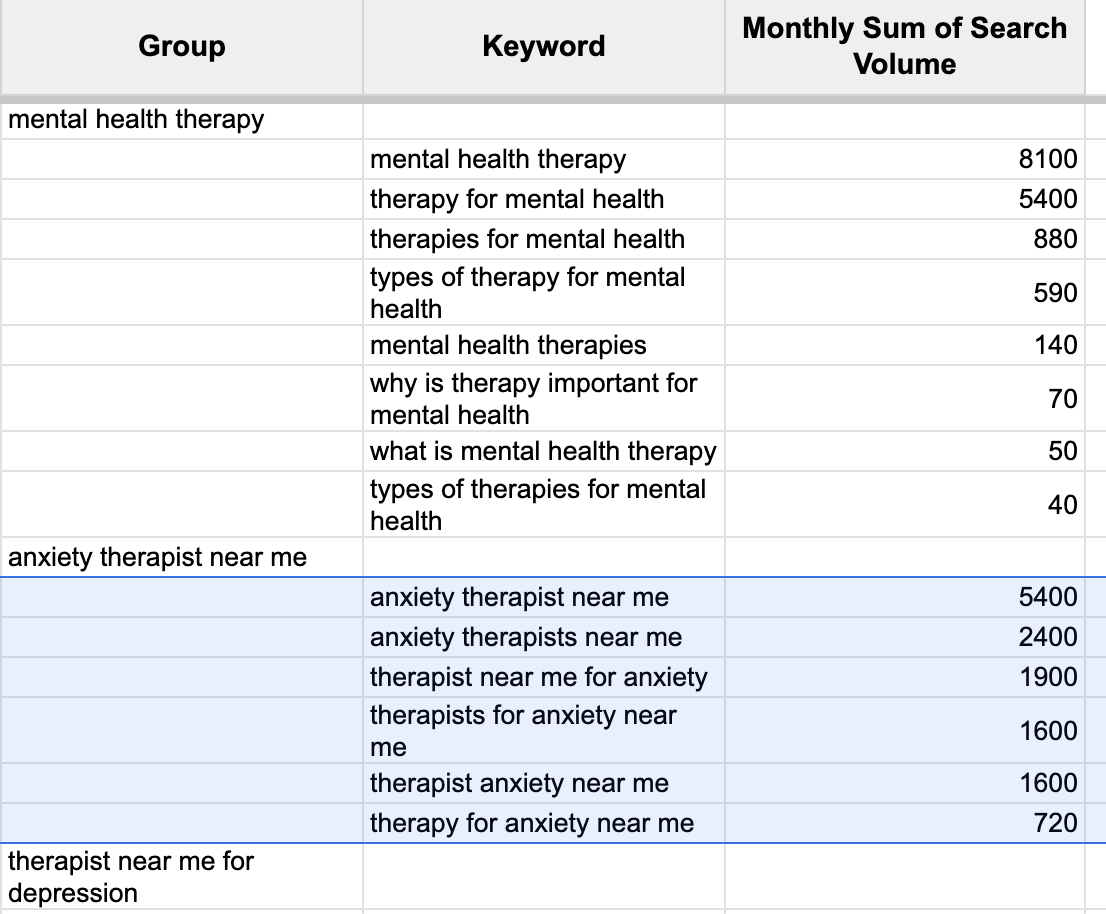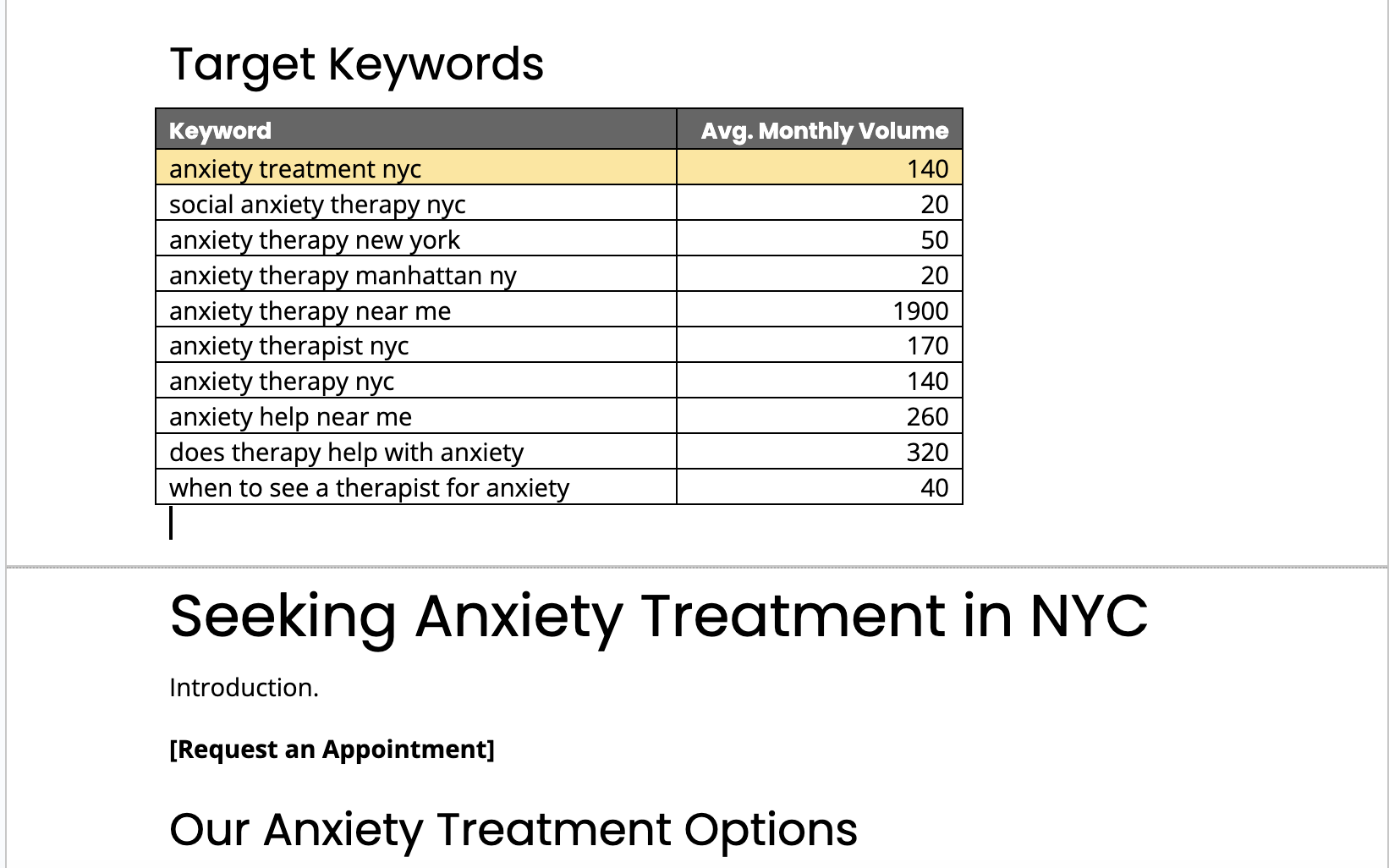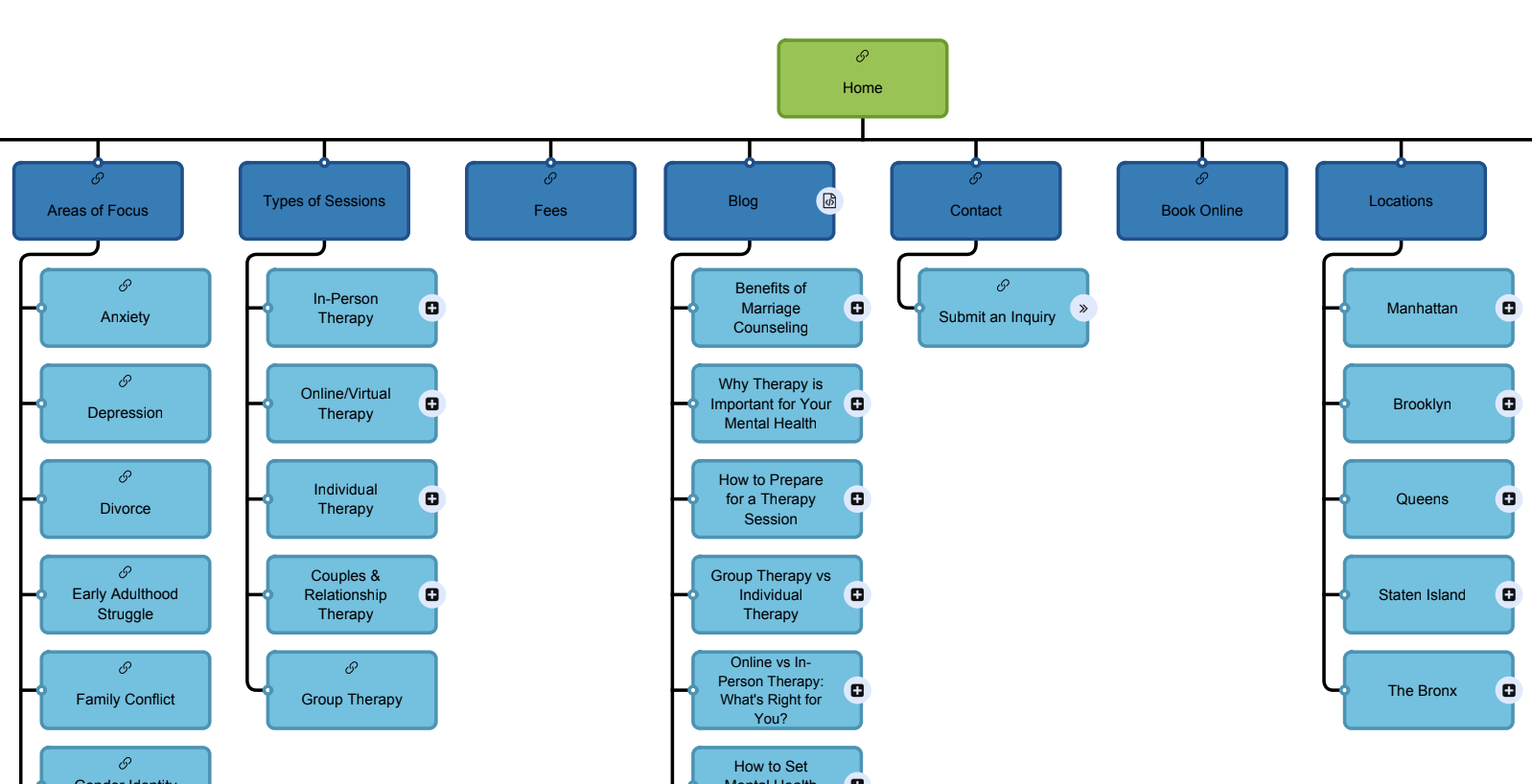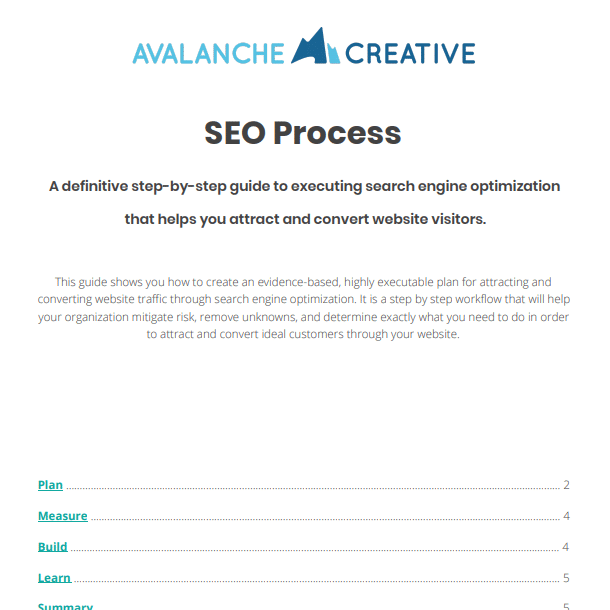How to Market Mental Health Services
Category: Healthcare, Industry Guide | Tags:
As the stigma surrounding mental health has begun to dissolve in recent years, more and more people are open to talking about their struggles with their emotions. As a mental health professional, you want to reach these people to provide helpful information and market your services.
Let’s be honest: as a mental health professional, your expertise is in mental health, not digital marketing. This guide will give you everything you need to know to reach those users who are looking for your resources and services.
How to Build an Effective Digital Mental Health Marketing Strategy
When it comes to planning your mental health marketing strategy, start with a skill that will likely be familiar to you as a mental health professional: practicing empathy.
Put yourself in the shoes of your ideal client: What would they look for? Where would they start? Think about the different touch points that you can use to create an opportunity for connecting with these potential clients in a meaningful, genuine way.
10 Tips for Mental Health Marketing
1. Research Mental Health Keywords for SEO
Search engine optimization (SEO) is the process of optimizing your website to appear in search engine results pages organically—meaning, without using promoted ads. Search engines like Google use many different factors to rank websites.
For mental health professionals, a great first step in building your mental health SEO strategy is to think about the queries that your ideal client would type into Google at the start of their mental health journey. Type these keywords into an SEO tool like SEMrush to see how many people are searching these terms and what questions they might have.
Don’t stop there! What are related keywords or questions relating to mental health that you can research? This will help you generate some high-quality content for your website that internet searchers—and search engines—will find highly valuable.
Additionally, include some cities or specific locations that you service in your research. This will come in handy when you implement your local SEO strategy.

2. Build Your Content Strategy
Once you have your list of keywords, take a step back and think about the mental health service pages and blog post topics that you can create that will naturally incorporate these keywords.
Prioritize the pages that explain your services first, as these are “low-hanging fruit.” Typically, users who visit these pages are closer to scheduling a session and becoming clients. Conversely, users who are looking at informational mental health blog posts may still end up converting into clients, but they may be simply in their research phase and trying to learn more about mental health, mental illness, or potential treatments. Your informational blog content can help build trust between you and that type of searcher, so if they do decide to give therapy a try, you’re at the top of their list.

Think of ways to promote these new content pieces as they are published. Remember, new content pieces on your website may take anywhere from 3–6 months to start ranking in search engine results pages (SERPs) organically. In the meantime, you can promote your content on social media, in email newsletters, or with paid digital ads.
3. Create Service Pages
An important part of your strategy is making sure that you have a dedicated page for every single service that you provide.
For example, if you offer anxiety treatment, create a page that focuses on the different therapy techniques and topics that come up in these sessions so potential clients know exactly what to expect. This will accomplish two things:
- It will provide a great resource for potential clients who are searching for more information about how to deal with anxiety and what treatment may look like.
- It signals to search engines like Google that you are an expert on this topic, which will help you rank for other related keywords.
Start by identifying the keywords from the initial list that you built when you started developing your mental health marketing strategy. Which of these should you be sure to naturally incorporate in this content? Then, build an outline of the page’s content using these keywords in a way that flows nicely, effectively explains your services, and takes many different angles to provide information about the topic.

4. Post Regular Blog Posts
Blog posts are a great way to market your mental health services to those who may not realize that you can help them. For example, someone searching for tips on dealing with anxiety may not be ready to think about talking to a therapist yet. Their intent is simply to receive tips on dealing with anxiety on their own.
You want someone like this to land on your website because not only can you provide them with tips and start to generate trust with them, but you can also direct them to other pages of your website, teach them about different therapy techniques that help to relieve anxiety, and ultimately show them how your mental health services can help them.
Posting informative and relevant blog posts signals to search engines that your website is updated with fresh content regularly, which is the type of site they want to direct searchers to.
5. Utilize Local SEO
You want to make sure that you are localizing your mental health marketing strategy so you appear to users who are in your target location. Here are a few local SEO strategies to implement in your overall marketing plan:
- Create service area pages. Make sure to include the specific cities where your clientele is located to ensure that you will appear for searches like “anxiety therapy in nyc”, for example. Just like your strategy with creating dedicated pages for each service, you will want to create a page for each service and each city that you can provide services for. Start with a larger state or city (like New York City) and, if the keyword data suggests it, don’t be afraid to target smaller neighborhoods or boroughs (like Queens, Manhattan, etc.) as well.
- Create or claim a Google Business Profile (GBP). GBPs are the profiles that appear when a person searches for something like “therapist near me.” Google will use their location information and pull up the Map Pack feature to show businesses that match their query that are the closest in proximity to their physical location.
6. Claim Your Local Citations
Another signal that will bolster your rankings in organic search results and support your mental health marketing plan is claiming any citations of your business in mental health or local directories. Be sure to optimize these citations for name, address, and phone number (NAP) consistency. Google likes its information to be neat and tidy, which means that having your NAP appear in the exact same format across the internet will signal to search engines that your business is high-authority.
Additionally, ensuring that these directory listings and citations link to your website will increase its domain authority.
7. Build Your Google Business Profile
Google loves when you utilize its products, such as Google Business Profiles. To ensure that your business’s profile appears as high as possible in the Map Pack for local-intent searches, make sure that it is fully optimized. Here are some optimization tips:
- Add photos of the inside and outside of your business (if you have a physical location) and label these photos as such.
- Add other photos of the people who work for your business, such as the mental health professionals who work with clients directly.
- Add frequently asked questions and answers to your profile to provide more information about your mental health practice.
- Read and respond to reviews regularly.
- Fill out as much information as possible about your business, such as if your location is wheelchair accessible or if you are LGBTQ+ friendly.
- Regularly add any special offers or updates to your company as posts. You can link to your website’s blog posts as they are published to help promote your content.
8. Optimize Your Website
The technical aspects of your website will signal to search engines if your site is “healthy” enough to send users to. Optimize your mental health website using technical SEO best practices, which prioritize a positive user experience. Here are some things to consider:
- Page speed: Make sure that your website is running smoothly and loads quickly by minimizing unnecessary code or plugins and by optimizing your images to be less than 250kb.
- Accessibility: Ensure that your website is accessible to users who may use screen readers to understand visual aspects of the site. For example, if you are using an infographic to explain your approach to a mental health issue, make sure that you are effectively describing this image in its alt text field.
- Linking: Check for any broken links, which are links that direct to a page that no longer exists on the internet. Search engines may penalize your site for sending 404 error codes. Also, look for opportunities to link to other pages within your website. This ensures that you don’t have any “orphan pages,” which are pages that aren’t linked from anywhere in your overall sitemap.
- Duplicate content: Make sure that all of the content on your website is fresh and unique. You don’t want to copy and paste entire pages or even sections of content across multiple pages of your website, because this will signal to Google that your content is not unique and therefore not high-authority.
9. Build a New Website
You may find that your existing mental health website could use a fresh start. If you want to refresh your branding and overall experience of your website, consider building a new website.
First, take a step back and review your mental health content strategy. Which pages have you identified that you need to create, and how do they link to each other?

From there, follow the steps of creating the content for each page, designing the pages in a user-friendly way, and publishing the pages using SEO best practices.
10. Cultivate Reviews
To bolster the visibility of your Google Business Profile, encourage your favorite clients to write a review.
For your mental health clients who may want to remain anonymous, you can collect reviews and testimonials and publish them to your website anonymously. These testimonials will signal not only to your website visitors but also to search engines that your mental health services are effective for many types of people. This will generate more trust in you as a mental health professional.
Additional Methods of Advertising Mental Health Services
Social Media Channels
A basic premise of mental health marketing is to meet your potential clients where they’re at. Many of your target audience may spend time on various social media platforms like Facebook and Instagram. Create a community on these platforms by sharing bite-sized mental health tips and facts that encourage discussion and sharing. Repurpose the content you create on your website into your social media posts to promote yourself as a mental health professional and expert in your field.
Social Media Advertising
Social media ads may help you reach a wider audience, especially if you are trying to grow your following. Advertising your mental health services on social media using location-specific parameters can help you reach the right people who can benefit from your business and services.
Email Marketing
If you haven’t already, start a mental health newsletter and encourage website visitors to sign up to receive tips and updates from your practice. You can use a powerful contact management tool like HubSpot to capture email addresses and nurture these leads to generate trust and keep them coming back to your website.
Attending Local Events
Brand exposure doesn’t exist only online. As a mental health professional, attending local events and networking with other businesses or members of your community can also bolster trust in you as an expert in your field. Creating these touchpoints and opportunities offline starts that relationship with a personal touch, making it easier for people looking for mental health services to trust you and want to work with you.
Radio and Video Ads
Another great opportunity for exposure and creating trust is to advertise your mental health services on local radio or video ads. Encourage viewers and listeners to visit your website to learn more about what you can offer them.
How to Frame Mental Health Marketing
Many of the same tactics that you use in your treatment plans and techniques can be considered best practices in marketing mental health services. Here are some concepts to keep in mind when developing your overall mental health marketing strategy.
Showing Empathy
Similar to counseling and developing a treatment plan for a client, having empathy for the end user is helpful when building your mental health business’ marketing and messaging. Put yourself in the shoes of that user who is embarking on their mental health journey: what kinds of things would they be looking for at the start of this journey, and what kinds of messages would resonate with them? This is a very helpful practice in building that ideal client journey.
Eliminating Stigma
In recent years, the stigma surrounding mental health conversations has started to dissipate. However, there is more work to be done in this area. It’s important to approach mental health topics in your marketing plan with openness while communicating the importance of mental and emotional health for everyone.
Offering Convenience
When it comes to mental health, people are looking for readily accessible information. If possible, make sure you provide information about pricing, insurance plans that you accept, and specific techniques or treatments that you utilize.
Additionally, if you offer any sort of virtual care, make sure that you spotlight this convenient service to those who prefer to receive mental health care in the comfort of their own home.
Focusing on Your Specialty
Casting too wide of a net can render your mental health marketing plan ineffective. Throughout the development of your marketing strategy, make sure you keep your specialties at the top of your mind. For example, if you specialize in helping members of the LGBTQ+ community navigate the complexities of family relationships, spotlight this in your messaging to help you connect directly with people looking for help in this area. Having more direct focus on these niche specialties will help you stand out from your competition.
How an SEO Agency Can Help Market Mental Health Services
Like many mental health techniques, SEO techniques empathize with the end user. Developing a marketing strategy that starts with SEO research and content can help mental health professionals propel their business forward and reach the right audience. However, not every therapist can afford the time it takes to prioritize both their practice and their digital presence. An SEO agency can focus on optimizing your website and bringing in new, targeted clients while you focus on providing treatment to your existing clientele.
Talk to the Mental Health Marketing Professionals
Your specialty is mental health. Our specialty is mental health marketing. Contact us to learn more about how we can help your practice reach a larger audience using digital marketing and SEO.
Share this article:
The Avalanche Email: Fun. Simple. Educational. No Selling.
Learn Result-focused SEO & Content
Join over 2,272+ others who get one email every Wednesday with simple instructions on how to get more website traffic and leads through SEO and content marketing. (Learn more about the email)
Start Marketing Your Mental Health Services

Is your mental health practice struggling to reach those in need? It can be hard to stand out in a competitive industry. An effective SEO strategy will help you understand your audience, competitors, and identify missed opportunities. Whether you need a new website, assistance with keyword research, or just a consultation, our team is here to help.
Related Resources

Download our SEO Process.
Keep Learning
Creating the Perfect SEO Content Template in Google Docs
Learn how to create an SEO Content Templates in Google Docs to help drive new traffic to your website from the search engines. SEO Content Templates provide specific recommendations and directives for creating new content on your website with the purpose of improving your SEO.
How To Show Up in Gemini (And Win More Local Jobs)
Show up in Gemini when homeowners search for landscaping services. Build the right signals on Google and your website to win more qualified local jobs.
How to Run Google Ads for Landscapers: A Complete Guide
Learn how to set up Google Ads for landscapers, attract qualified leads, and win more local jobs with this step-by-step guide.
🏔️ Watering > Planting New Seeds
Your next marketing win may already be on your site. Learn how to optimize existing pages for better rankings, traffic, and results.
The Recipe vs. The Meal
Your customers buy the experience, not the product. Discover a simple way to shift your message from ingredients to the full meal.
What’s the Best CMS for Landscaping Businesses?
Compare the best website platforms for landscapers. Learn the pros and cons of Wix, Squarespace, and WordPress, and why WordPress is best for long-term SEO.

![Keywords for Counselors & Therapists: A Complete List [Download Available]](https://avalanchegr.com/wp-content/uploads/2021/02/wordcloud-150x150.png)





